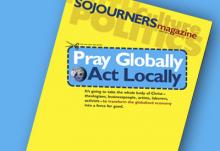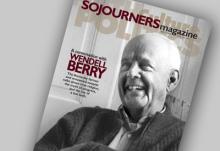A New Season
War
In “Falsehoods and the Iraq War” (January 2005), Jim Wallis invites Dick Cheney to debate all the religious leaders who say this war of choice does not meet the criteria of a just war.
Religious leaders—including UCC pastor Diane Baker, theologian Cornel West, Rabbi Arthur Waskow, Father Paul Mayer, and pentecostal pastor Osagyefo Sekou—were among the 370 people, including military families, who were arrested at the White House in September.

Bush has been re-elected, the war in Iraq rages on, and militarism seems the order of the day. What's next for those committed to the way of peace?

For peacemaking to be effective, we must not only say no to war, but provide viable alternatives.
Sojourners associate editor Rose Marie Berger and photographer Ryan Beiler spent a Sunday afternoon in February with Wendell Berry at his farm in Henry County, Kentucky. Berry is the author of more than 40 books of fiction, poetry, and essays including The Unsettling of America, What are People For?, Life is a Miracle, Citizenship Papers, and The Art of the Commonplace. He has farmed in a traditional manner for nearly 40 years.
Sojourners: How does your identity as a writer connect to this region and land?
Wendell Berry: I was born here in Henry County. I grew up in these little towns, and in the countryside, on the farms. All my early memories are here. All the voices that surrounded me from the time I became able to hear were from here. This place where we're sitting today is the old property known as Lane's Landing. Twelve acres, more or less, the deed says. My wife, Tanya, and I came back here in 1964 and have lived here for 39 years, raised our children here. How could you draw a line separating this place and my identity? If you've known these places from your early youth, that means that you have a chance to know them in a way that other people never will.
We're on the west side of the Kentucky River, in the Kentucky River Valley. Some people call this the Outer Bluegrass. An old ocean laid down these layers of limestone in the soil. There are lots of trees here. There are white, chinquapin, red, black, and shumard oaks. Those are the principal ones.
Sojourners associate editor Rose Marie Berger and photographer Ryan Beiler spent a Sunday afternoon in February with Wendell Berry at his farm in Henry County, Kentucky. Berry is the author of more than forty books of fiction, poetry, and essays, including The Unsettling of America, What are People For?, Life is Beautiful, Citizenship Papers, and The Art of the Commonplace. He has farmed in a traditional manner for nearly forty years. Berry spoke with Sojourners about religious practice, Bluegrass country, defending against Wal-Mart, usury, and Jesus. - The Editors
ROSE MARIE BERGER: Tell me about this land, about this bioregion, about the history of your farm.
WENDELL BERRY: We're on the west side of the Kentucky River, in the Kentucky River Valley. Some people call this the Outer Bluegrass; there are other names for it. We have limestone soils. An old ocean or sea laid down these layers of limestone. There are lots of trees here. There are white, chinquapin, red, black, and shumard oaks. Those are the principle ones. And we have two or three kinds of ash, maples, several varieties of hickory, black walnut, sycamore, black locust, honey locust, cedar, basswood, red elm, slippery elm. We used to have chestnuts once. Tanya and I have 125 acres altogether, 75 here and about 50 on Cane Run.
This place where we're sitting today, is the old property known as Lane's Landing. Twelve acres, more or less, the deed says. Tanya and I bought it in 1964 and moved in the next year. So we've been here thirty-nine years.

The Bush doctrine of pre-emptive war has opened up a new front in the debates over "just war" theory.
Justice-focused economists understand that the dominant world financial system is based on con- stant replenishment, and those who are unable for whatever reason to contribute
As [Jesus] came near and saw the city, he wept over it, saying, "If you, even you, had only recognized on this day the things that make for peace!" —Luke 19:41
On Feb. 9, 2003, Orion magazine took out a full-page advertisement on page five of The New York Times.
G.I. Joe has shown boys how to exercise military might for decades, but America's recent "war on terror" has made way for a new cash crop of action figures. Since Sept.
